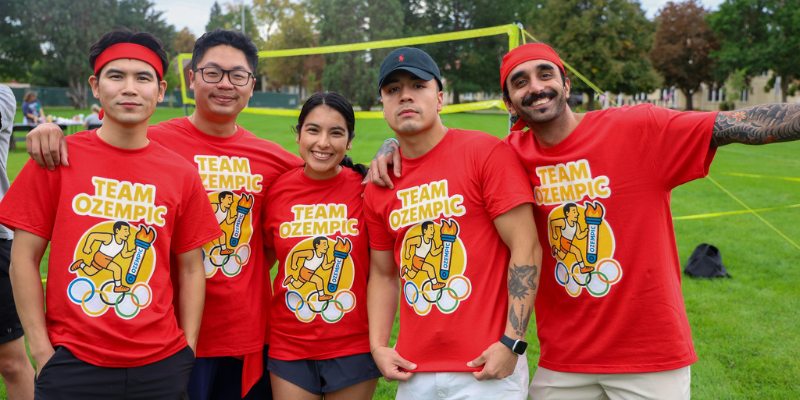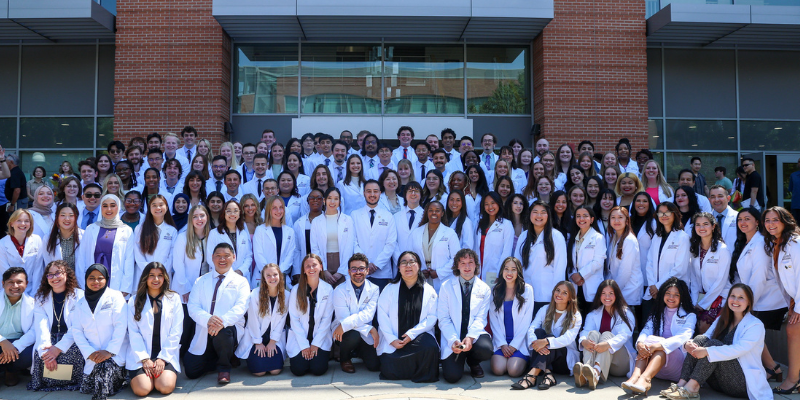So, let me tell you my main goal in the next few years. My grandparents are both 83 years old, and are moving down to Denver so they can be closer to more of our family. My goal is to make these years, if not the best years of their lives, years’ worth remembering. Maybe I'm shooting myself in the foot here, since it's not related to pharmacy—not directly, at least, but the lessons I've learned in Dr. Linnebur's class as well as the overarching philosophy of my long-term care pharmacy's consultant have educated me tremendously in my perspective on geriatrics. It is a small goal of mine in the next few years to try to become a pharmacy consultant as I feel a lot of good can be done.
In the pharmacy profession, I think there's a prevailing tendency to think about positive space—what can we add to this patient's regimen—as opposed to negative space, or what can be removed. Both can be victories, I think. As I learned from our consultant and Dr. Linnebur, I think in the geriatric population in particular, it's important to think in terms of how one can trim our patients' medication lists, as well. This gets into the concept of "lag-time to benefit"—sure, this drug may be proven to provide a mortality benefit, but if the time to receiving the benefit exceeds the life expectancy, then is it really worth having on board? Guidelines often do have age limitations to their recommendations, but I feel like sometimes these can get lost in the shuffle or perhaps "grandfathered in" if a patient has been on “XYZ” maintenance medication for decades and was never reexamined for their increasing age (e.g., setting higher A1C goals for the elderly and perhaps backing off on therapy, especially if they're getting lows).
I am a fan of keeping things simple and in an ideal world, I would have none of my patients on any medications (shocker!), and everything would be handled non-pharmacologically through diet and exercise. As ironic as it sounds, I'm not the biggest fan of medications and often wonder if American culture is overmedicated. That is my ideal (my MBTI/Jung type is ISFP, so perhaps I am prone to thinking about the ethics/ideals of things too much). However, the world is not ideal, but terribly, terribly real, and medications do have their place. I will confess that I am a notorious fence-sitter and have always had difficulty "taking sides" in anything remotely political. I read Melody Peterson's Our Daily Meds during P3 year, which is a book focusing on the business and marketing practices of pharmaceutical companies—particularly the way they might "hype" disease through aggressive marketing campaigns as well as the conflicts of interest with healthcare workers paid to speak on a product's behalf. I'm not a fan of Big Pharma. I recognize that research and development is not exactly cheap. But cases like last year's Daraprim pricing fiasco highlight, I think, the importance of protecting our patients as a vulnerable consumer population (and I believe that situation was ultimately handled appropriately, so kudos to the Feds).
Small victories
But getting back to my grandparents and a thought I had today as I took care of them: I think it is very easy to take things for granted and think about what is missing, but those small victories—maybe those are what make the whole struggle worth it, I think, even if things are ultimately imperfect or the road to get there was paved with potholes and roadblocks. I dislike thinking about the future or planning and much prefer to focus on what can be fixed or improved in the here and now. In pharmacy school, I struggled with what was missing. Try as you might, it's hard not to compare yourself to your classmates, and there are so many stellar students with blindingly radiant CVs that I can often feel... lackluster by comparison. We can't all get hospital internships, and yeah, there are many that apply to residencies that simply won't get one. I, myself, am still weighing my options post-graduation, and I am probably not as prepared as I should be. That said, I could be much, much worse off, and compared to a year ago, I feel much more prepared for the next steps (whatever those may be).
My grandparents cannot really take care of themselves, so our family has decided to move them to Denver where we can be closer to them. Now, warning, but this is not an endeavor to undertake lightly and is certainly not for everybody; my family is fortunate in the sense that we have a good number of us and many of us are healthcare workers. It is well within reason to consider assisted living or skilled nursing at this point in time, and services provided by those facilities are very important (although to be fair, my grandmother is on zero medications and has "blood pressure like a teenager;" both of which she is quite proud of). Nevertheless, we are also honoring our grandparents' wishes that they not be placed in a home (for as long as we reasonably can, of course).
So, this is where I was thinking today about the small victory. My grandmother plays the piano, and I always bring my violin, and we jam tunes out for a bit. It helps make the new place feel more like home and keeps her occupied, recognizing that she is leaving her old house she's been living in for about 45 years. I'm not great with musical theory, but it's interesting how we sort of speak the same language... Bach's Minuet in G Major sounds lively and upbeat, Minuet in G Minor sounds far more dismal, and both of us can tell pretty quickly in the first few bars.
Patience and understanding
I won't mince words, though. I think working with the elderly population requires at least two things: Patience and realizing that aging is, quite simply, a very, very difficult process. I don't think any of us really get what it's like until it actually hits. When you age, you slow down and things are just more difficult in general (from virtually every angle; even putting on clothes or getting into bed may now present a fall risk). So maybe a hike through a national park is no longer possible, but a walk down the block is. Or perhaps due to old habits, they may not eat the best, but if you can get one good, balanced meal in them, that is another small victory. At some point, in geriatrics, I think there comes a time where you must make concessions and take your victories where you can, because, reality check: Not everyone will be the paragon of health, and for most people, it kind of is a downhill thing. In some regard, I kind of hope in another life, maybe I made the decision to go into physical therapy, since I am a very hands-on person and like working on the frontlines.
To me, however, it is making the descent as gentle and free from stress as possible. The way I see it is this: If I can improve just one thing in their life or remove one bad thing that causes unnecessary worry, then that's a win in my book. The world is not perfect but it is a little bit better, maybe. Raymond Carver, the minimalist short-story writer who is, in my opinion, one of the greatest writers ever to have graced us, once wrote in his poems:
“there isn't enough of anything
as long as we live. But at intervals
a sweetness appears and, given a chance
prevails.”



